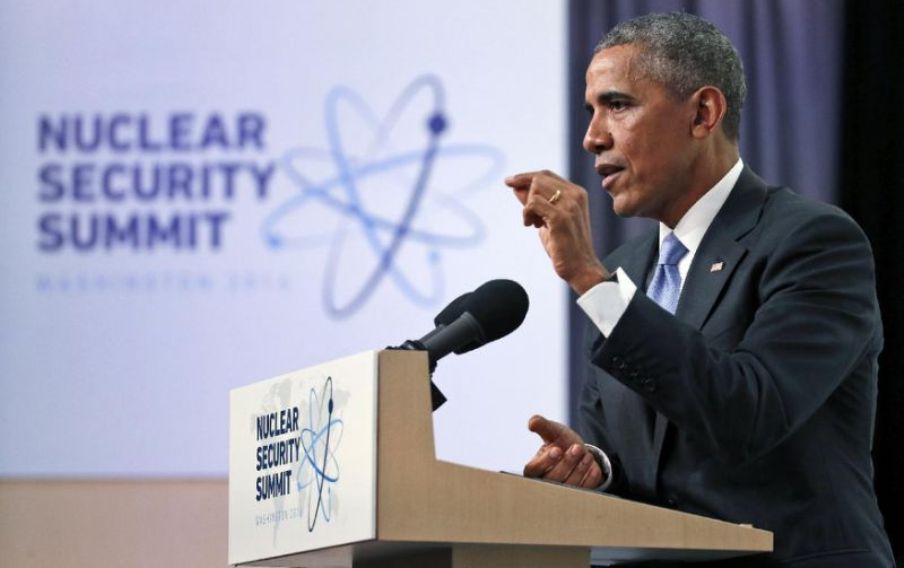
One week ago, President Obama closed the Nuclear Security Summit in Washington with these words:
“This afternoon’s session turns the focus on the terrorist networks themselves. It tells us the possible consequences of terrorists obtaining and using a weapon of mass destruction. Fortunately, as I said this morning, no terrorist group has yet succeeded in getting their hands on a nuclear device. Our work here will help ensure that we’re doing everything possible to prevent that.”
In reading his entire speech and news reports, you would think that the Summit covered all the critical aspects of this issue. Not so.
As Nuclear Age Peace Foundation President David Krieger pointed out to me, “The Nuclear Security Summit didn’t deal with nuclear weapons themselves, which are the greatest danger of all. The leaders did not talk about nuclear disarmament. They focused on a small percentage of highly-enriched uranium that exists in civilian stores.
“There are great stores of weapons grade materials as well as nuclear warheads and delivery vehicles that were not dealt with at the Summit. There was no discussion of Plutonium-239, another material for making nuclear weapons. Nor was there any discussion about the obvious concern of nuclear power plants as attractive targets for terrorists.”
Krieger added, that “The issue of nuclear terrorism is a very serious threat, but world leaders need to do much more to assure it doesn’t happen – ever!”
Next Month, the president will be attending the G-7 Summit in Japan. This is a perfect opportunity for President Obama and others to take time to visit Hiroshima where the first nuclear weapon was used during World War II.
Last month, Krieger wrote the president urging him to visit the site.
“You could draw the world’s attention to the ongoing threats to all humanity posed by nuclear weapons, as you did so effectively in your speech in Prague in 2009. You could also acknowledge the atomic bomb survivors (hibakusha) who have worked so diligently for a nuclear weapon free world.”
As the N.A.P.F. writes, “President Obama would become the first sitting U.S. President to do so. It could set a positive tone for the remainder of President Obama’s term and help awaken the people of the world to the continuing threats posed by today’s nuclear arsenals.”
Krieger wrote to me about some recent news.
“For the first time in history, the International Court of Justice (I.C.J.) heard contentious cases on the legality of nuclear weapons in March 2016. The cases were brought by the tiny Pacific nation, the Republic of the Marshall Islands (R.M.I.).
“On day two of the hearings in the Hague,” Krieger writes, “Tony de Brum, former Foreign Minister of the R.M.I. opened the session at I.C.J. in front of fifteen judges with a powerful personal story:
“ ‘Yesterday was a beautiful morning here in The Hague that featured a picture-perfect snowfall. As a tropical State, the Marshall Islands has experienced snow on one memorable and devastating occasion, the 1954 Bravo test of a thermonuclear bomb that was one-thousand times the strength of the Hiroshima bomb. When that explosion occurred, there were many people, including children, who were a far distance from the bomb, on our atolls which, according to leading scientists and assurances, were predicted to be entirely safe. In reality, within 5 hours of the explosion, it began to rain radioactive fallout at Rongelap. Within hours, the atoll was covered with fine, white, powdered-like substance. No one knew it was radioactive fallout. The children thought it was snow. And the children played in the snow. And they ate it. So, one can understand that snow, while beautiful, has a tragic and dark history in the Marshall Islands.’
“Three out of the nine nuclear-armed nations – the United Kingdom, India and Pakistan – accept the compulsory jurisdiction of the Court. This set of hearings addressed the three respondent nations’ objections to the cases relating to questions of jurisdiction and admissibility. The United Kingdom and India participated in the oral arguments, while Pakistan chose to rest on its written brief. During the hearings, all three respondent nations claimed in written and/or oral pleadings that they are supportive of nuclear disarmament and that they agree with the R.M.I. about the need for a nuclear weapons-free world. The I.C.J. will announce its decisions in a public sitting at a date yet to be announced.
“Today,” Krieger points out, “101 organizations have expressed active support for the nuclear zero lawsuits, urging leaders to begin good faith negotiations. The growing list includes: Free the Children; Nobel Women’s Initiative; Greenpeace International; Soka Gakkai International; World Council of Churches; Campaign for Nuclear Disarmament; Pax Christi International; International Physicians for the Prevention of Nuclear War; and Veterans for Peace, to name a few.”
Recent attacks in Paris and Brussels have only increased the very real threat that ISIS and other terrorists groups pose to the rest of the world. And we know that ISIS is working hard to get nuclear material to use in a future attack.
As an editorial in The New York Times (Mar. 27), points out, “Since the end of the Cold War, the United States and Russia have sharply reduced their nuclear arsenals, but Moscow has rejected further negotiations and both countries are pursuing costly new modernization programs. India, Pakistan and North Korea are also expanding their programs. There are signs that overall stockpiles of nuclear weapons and nuclear material may again increase. That disturbing trend must be reversed.”
Comments









